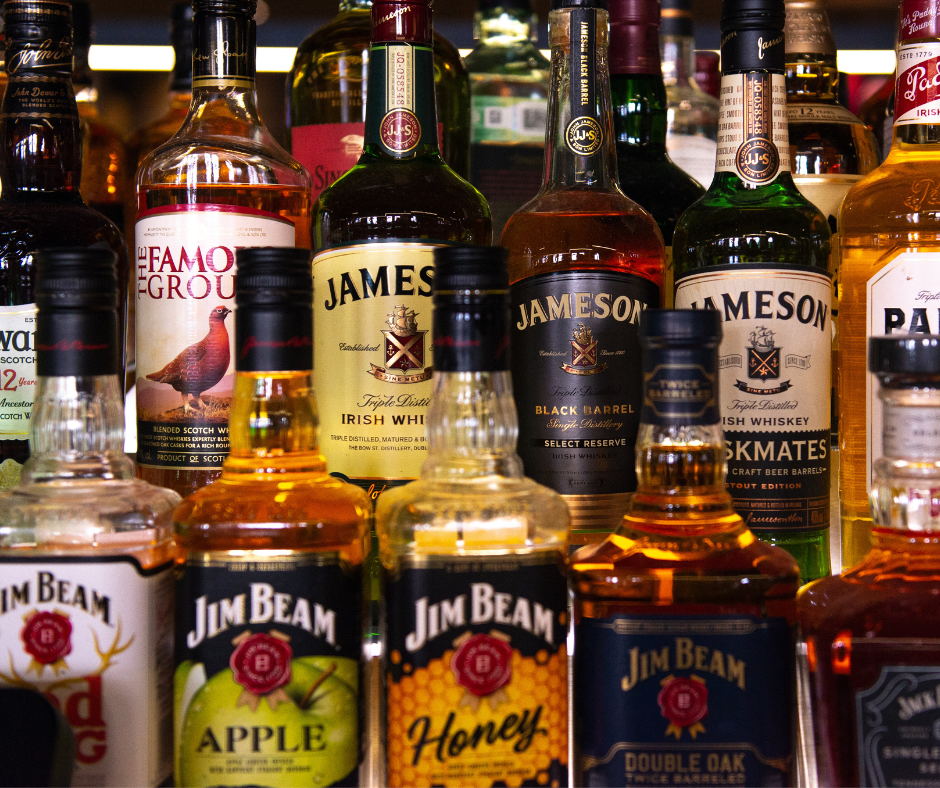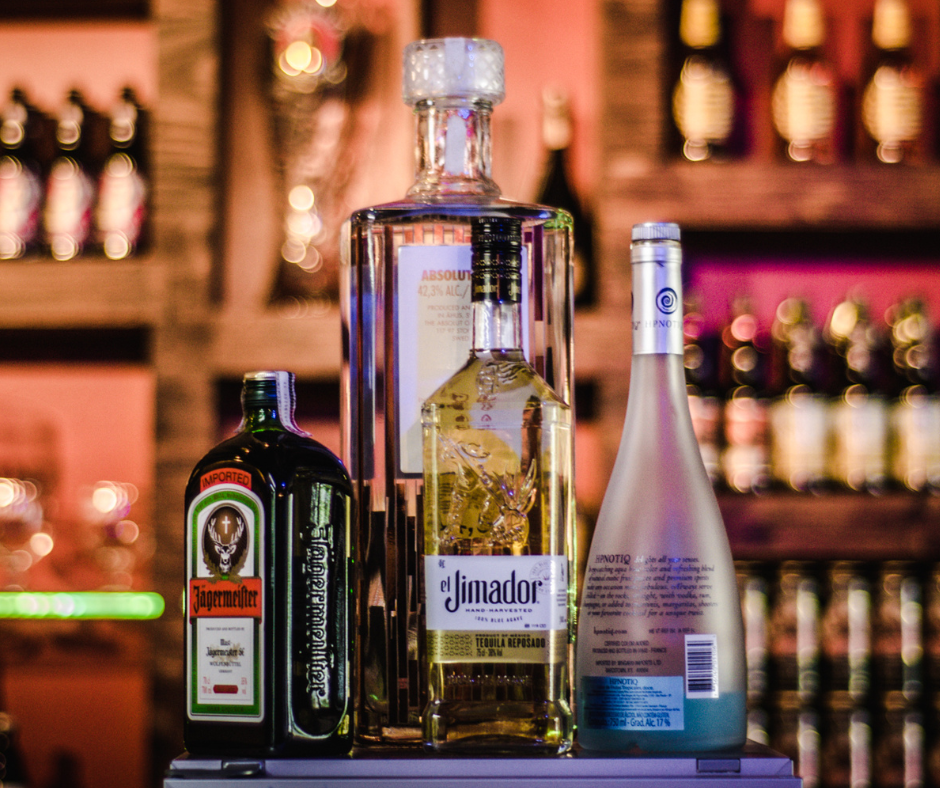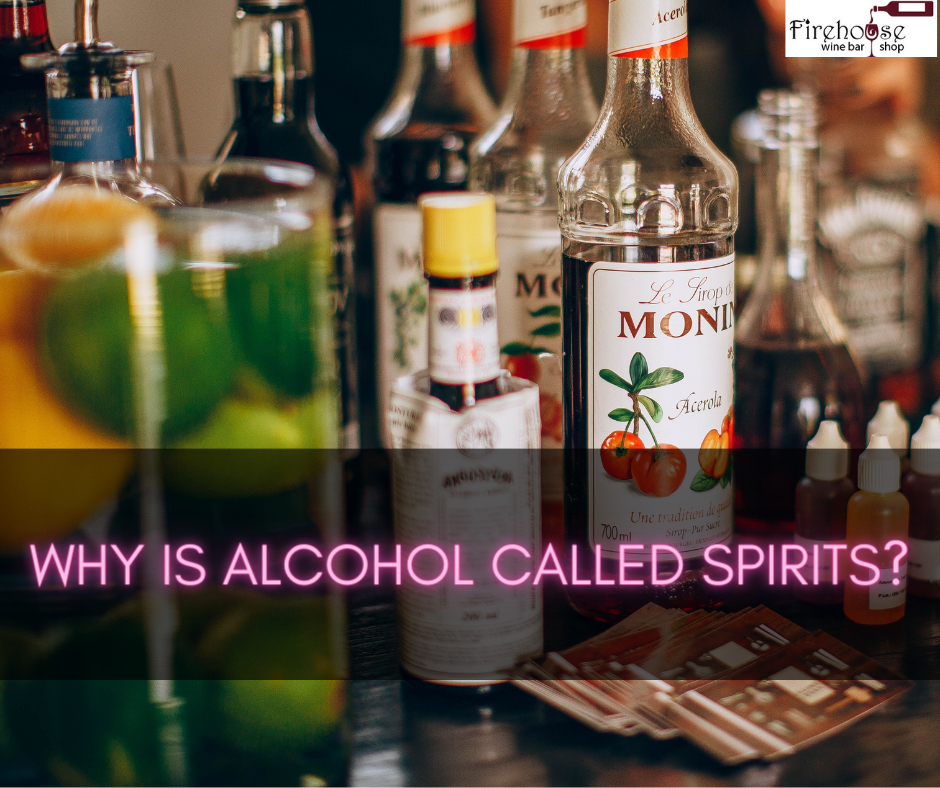Introduction
Alcohol has been called “spirits” for centuries, but have you ever wondered why? Why Is Alcohol Called Spirits? The term “spirits” is often used to describe strong distilled liquors such as brandy, whiskey, gin, or rum. In this blog section, we will delve into the origins of this term and uncover its fascinating history.
The Origin And Evolution Of The Term Spirits
The origin of the term “spirits” for alcohol is mysterious, with multiple theories and historical references. Let’s explore a few of the popular explanations:
- Greek and Roman Influence: One theory traces the name “spirits” back to ancient Greece. The Greek philosopher Aristotle mentioned a distillation process in 327 B.C., referring to the distilled beer or wine as “spirits.” He believed that consuming these drinks infused the spirit or essence into the drinker’s body. However, this explanation is somewhat doubtful, as Aristotle would have used the word “pneuma” to describe spirits in the way we understand them today. Another connection can be made to biblical times, where the Holy Spirit was associated with various elements, including fire and wind. In Acts 2:13, observers mistook the effects of the Holy Spirit on the disciples as intoxication from excessive wine consumption. This association might have contributed to spirits being intoxicating like alcohol.
- Alchemical Origins: The Middle East is believed to be the birthplace of distillation, and alchemists were the first to master the process. Distillation was initially used to create medical elixirs, and the distilled liquid was called “spirits.” Franciscan monk Roman Llull is credited with some of the earliest documented formulas for distilling alcohol from wine. In this context, ” spirits ” refers to the essence or spirit of the fermented liquid. Over time, as distillation techniques improved and alcohol production became more widespread, the term “spirits” began encompassing a broader range of distilled liquors.
While the exact origin of the term “spirits” remains somewhat uncertain, it is clear that it has evolved to describe distilled liquors with higher alcohol content. Today, the term is widely used to refer to strong alcoholic beverages.
In conclusion, “spirits” have a rich and complex history rooted in ancient beliefs, alchemical practices, and cultural influences. Understanding the origins of this term adds an extra layer of fascination to the world of alcohol and its diverse assortment of spirits.

Historical References
The terminology used to describe alcohol has always intrigued people, especially “spirits.” But have you ever wondered, ‘Why Is Alcohol Called Spirits?’ Unveiling the origins of this term provides us with fascinating insights into ancient beliefs, practices, and alchemy.
Ancient Beliefs And Practices Surrounding Alcoholic Drinks
One theory dates back to the ancient Greeks, particularly to the philosopher Aristotle. In 327 B.C., Aristotle mentioned a process in which distilled beer or wine put “spirits” into the drinker’s body. However, no concrete evidence suggests that the Greeks were distilling spirits on a significant scale during that time. If Aristotle were referring to spirits as we understand them today, he would have used the word “pneuma,” which means breath, spirit, or soul in ancient Greek. The connection between Aristotle’s usage and the modern notion of spirits remains uncertain.
Another explanation can be traced back to biblical times. The New Testament depicts different images of the Holy Spirit, including fire, wind, water, and a dove. In Acts 2:13, when the Holy Spirit descended upon the disciples during the first Pentecost, some onlookers mistook the effects as intoxication from excessive consumption of new wine. This association between the Holy Spirit and an intoxicating spirit may have influenced the term “spirits” to refer to alcoholic drinks. However, this connection is open to interpretation.
The true origins of the term “spirits” can be found in the early alchemists of the Middle East. These alchemists were pioneers in the distillation process, which they primarily used to create medical elixirs. For example, the Franciscan monk Roman Llull developed specific formulas for distilling alcohol from wine. Distillation separates the alcohol from the liquid, increases its concentration through evaporation, and condenses it into a purer form. In this process, the “spirit” of the liquor, or the essence of the alcoholic component, is extracted. Thus, we refer to alcoholic drinks as “spirits” because we are consuming the distilled essence of the fermented liquid.
These historical references give us multiple interpretations of why alcohol is called spirits. While the exact origin may remain uncertain, it is intriguing to delve into the intricate relationship between ancient beliefs, alchemy, and the terminology associated with alcoholic drinks.
Stay tuned for the next section, where we explore the various types and classifications of spirits and their significance in the world of alcohol.
The Role Of Distillation
The term “spirits” is commonly used to refer to various types of alcoholic beverages such as brandy, whiskey, gin, and rum. But why are they called spirits? The answer lies in the process of distillation.
Distillation is a technique that involves heating a liquid (such as wine or beer) to create vapor and then cooling the vapor back into a liquid form. This process allows for the separation and concentration of alcohol from the original fermented liquid. Distilled liquors tend to have a higher alcohol content than other alcoholic beverages.
How Distillation Contributed To The Term Spirits?
The origins of the term “spirits” for alcoholic beverages can be traced back to ancient times. One theory suggests that the word “spirit” was used to describe the distilled alcoholic liquid because it was believed to contain the essence or spirit of the original fermented material.
During the Middle Ages, alchemists in the Middle East began perfecting the distillation process for medicinal and religious purposes. They discovered that distillation allowed for the extraction of valuable essences and produced potent and concentrated forms of alcohol. The term “spirit” became associated with these distilled liquors, symbolizing their mystical and transformative nature.
It’s important to note that the exact origins of the term “spirits” are somewhat uncertain, and competing stories surround its usage. However, the connection between distillation and “spirits” remains prevalent.
In modern times, the term “spirits” has become widely accepted for referring to a broad range of distilled alcoholic beverages. These spirits come in various types, flavors, and compositions, offering a diverse and vibrant selection for consumers to enjoy.
Here’s a table comparing some popular spirits:
| Spirit | Main Ingredient(s) | Flavor Profile |
|---|---|---|
| Brandy | Grapes | Fruity, Sweet |
| Whiskey | Grains (e.g., barley, corn, rye) | Rich, Smoky |
| Gin | Juniper berries and botanicals | Herbal, Floral |
| Rum | Sugarcane or molasses | Sweet, Spicy |
Whether you prefer the smoothness of brandy, the complexity of whiskey, the botanical notes of gin, or the tropical vibes of rum, there’s a spirit out there to suit every palate.
In conclusion, “spirits” for alcoholic beverages originated from the association between distillation and the extraction of concentrated essences. This connection has endured throughout history, and today, the term continues to embody the diverse world of distilled liquors. So, the next time you sip on your favorite spirit, remember its rich history and craftsmanship.
Cultural Significance
Alcohol is commonly called “spirits,” but have you ever wondered why? The term “spirits” has a long and fascinating history that dates back centuries. In various cultures and religious traditions, alcohol has been associated with supernatural and divine qualities. Here, we unveil the origins of the term “spirits” for alcohol and explore its cultural significance.
In many ancient cultures, alcohol was seen as a mystical and magical substance. It was often used in religious rituals and believed to impact one’s spirit or soul profoundly. This belief can be traced back to the alchemists of the 14th century, who recognized the magical nature of the distillation process. They perceived alcohol as a potent elixir that could capture a liquid’s essence or spirit.
The word “spirit” has Latin origins, derived from the word “spirit,” which means breath or wind. In the Middle Ages, the term began to describe supernatural entities and divine elements. While the earliest record of the word “spirit” did not specifically denote distilled liquor, it gradually encompassed intoxicating alcoholic drinks in the 16th century.
Symbolism And Metaphorical Interpretations Of Spirits
The association of alcohol with the term “spirits” has led to various symbolic and metaphorical interpretations. One interpretation is that alcohol is called spirits because it can evoke a sense of intoxication similar to the effects of possession by a supernatural entity. Just as spirits can alter one’s perception of reality, alcohol has the ability to induce altered states of consciousness.
Furthermore, the term “spirits” can also be seen as a reflection of the transformative power of alcohol. Just as distilled liquor goes through a process of extraction and purification, individuals might seek solace, inspiration, or a temporary escape from the consumption of spirits.
To further understand the cultural significance of the term “spirits” for alcohol, it is essential to explore the context of different religious and philosophical traditions. For example, in Christianity, alcohol is sacred in sacraments such as the Eucharist. The consumption of wine during religious ceremonies symbolizes the spiritual connection between believers and the divine.
In conclusion, the term “spirits” for alcohol carries a rich cultural history and deep symbolism. The association with supernatural and divine qualities reflects humanity’s fascination with altered states of consciousness and the search for spiritual experiences. Whether used for religious rituals, celebrations, or simple enjoyment, the term “spirits” serves as a reminder of the nuanced relationship between alcohol and the human spirit.

Scientific Explanation
Have you ever wondered why alcoholic drinks are commonly called “spirits”? The origin of this term is shrouded in mystery and has various theories surrounding its beginnings. While no one can say where the term originated, several interesting explanations shed light on this peculiar naming convention.
The Evaporation Phenomenon And Its Relation To Alcoholic Drinks
One scientific explanation points to the process of distillation, which is integral to the production of spirits. Distillation involves heating a liquid (such as wine or beer), collecting the vapor released, and then condensing it into liquid form. This process effectively separates the alcohol from the original mixture, producing a more concentrated and potent alcoholic beverage.
During distillation, the heat causes the liquid to evaporate, leaving behind the alcohol as vapor. This evaporation phenomenon is likened to releasing a “spirit” from the original mixture. In ancient times, alchemists recognized the magical nature of this distillation process and began associating the term “spirit” with the distilled liquid.
The term “spirit” has Latin origins, with “spiritus” meaning breath or wind. It eventually came to refer to a person’s character or disposition. In the Middle Ages, the word started describing both the supernatural and the divine. Alchemists, linking the mystical nature of distillation to the release of a concentrated substance, began attributing the term to liquor.
While there is no definitive historical evidence pinpointing the exact moment when the term “spirits” was first associated with alcohol, it is clear that distillation played a significant role in its development. Capturing the liquid’s essence—or spirit—through evaporation and condensation became the basis for this intriguing naming convention.
In summary, the term “spirits” for alcoholic drinks likely emerged from the mystical nature of the distillation process. The evaporation phenomenon and the separation of alcohol from the original mixture were believed to release a concentrated “spirit” that conferred its intoxicating effects. Although the origin may remain elusive, the ancient connection between distillation and the term “spirit” fascinates and intrigues alcohol enthusiasts today.
Why Is Alcohol Called Spirits? – Unveiling The Origins Of The Term “Spirits” For Alcohol
Alcohol, often called “spirits,” is a beverage humans have enjoyed for centuries. But have you ever wondered, ‘Why Is Alcohol Called Spirits?’ The origins of this term are shrouded in mystery, with several theories and historical connections. This section will explore possible explanations for why alcohol is called spirits.
One theory suggests that the term “spirits” originated from ancient times when alchemists experimented with distillation. The distillation process involves heating a base liquid and collecting the vapor to extract its essence. This essence, believed to be the life force of the substance, was referred to as “spirit.”
Another theory connects the term “spirits” to the Arabic word “al-shawl,” which means “spirit” or “demon.” This connection may be attributed to the effects of intoxication that alcohol can induce, giving a sense of being under the influence of a spirit.
In religious and biblical contexts, the word “spirit” might also contribute to its association with alcohol. The Holy Spirit is often symbolized by elements such as wind, water, or fire, which can be likened to the sensations experienced when consuming alcohol.
Interestingly, the origins of the term “spirit” date back to ancient eyeliner. The black mineral substance used to make ancient eyeliner called “stibnite” was known as “alcohol” in Arabic, which means “to paint.” Making eyeliner involves a form of sublimation similar to distillation. Over time, “alcohol” became more generalized to refer to any distilled substance, including liquor.
While the exact origin of the term “spirits” remains uncertain, it is clear that the connection between alcohol and spirits has persisted throughout history. Distillation techniques developed by alchemists and the purification process of capturing the essence of a liquid may have contributed to the association of alcohol with spirits.
So, the next time you enjoy a glass of your favorite spirit, remember its intriguing historical connections and the theories surrounding its name. Alcohol, with its diverse meanings and rich history, continues to bring people together and add spirited flavor to social gatherings.
Continue reading to learn more about the benefits and risks of alcohol consumption.
Popular Theories And Folklore
The origins of the term “spirits” to refer to alcohol have fascinated many, leading to diverse explanations and legends surrounding its usage. While there isn’t a definitive answer, several theories have emerged throughout history to explain this intriguing term. Let’s explore some popular theories and folklore surrounding the term “spirits.”
One theory suggests that the term “spirits” originated from alchemy and distillation practices dating back to ancient times. Alchemists believed that alcoholic beverages had mystical properties, capable of transforming common metals into gold. They referred to these beverages’ magical essence or life force as “spirits.” This essence was believed to contain the spirit that infused the drink with its power and the essence of the plant or grain from which it was derived.
Another theory traces the origin of the term “spirits” to the Middle East. The word “alcohol” itself is derived from the Arabic word “al-Kuhl,” which was used to refer to various substances, including kohl (a type of eyeliner). It is possible that the word “spirit” evolved from this Arabic root, further emphasizing the association of alcohol with mystical properties.
Throughout history, “spirits” have expanded to include distilled alcoholic beverages such as whiskey, gin, vodka, rum, tequila, and brandy. Each spirit has its distinct taste and personality, depending on the ingredients used and the distillation process employed. For example, whiskey is aged in oak barrels, while vodka is purified through charcoal filtration.
While the terms “spirits” and “liquor” are often used interchangeably, some people use “liquor” specifically to refer to distilled beverages that are not aged, such as vodka and gin.
Spirits are pricier than other alcoholic beverages because they undergo a more complex and costly distillation process. In addition, many spirits are aged in oak barrels, which adds to their cost and imparts unique flavors.
It’s important to note that not all spirits are gluten-free. Spirits made from grains, such as whiskey and vodka, may contain gluten unless specially distilled or filtered to remove it. However, spirits from other ingredients like tequila and rum are typically gluten-free.
Whether you prefer gin, vodka, rum, tequila, or brandy, there is a spirit to suit every mood and occasion. The term “spirits” has evolved over time, encompassing a wide range of distilled drinks with distinct flavors and personalities. So, the next time you enjoy a cocktail or a glass of your favorite spirit, take a moment to appreciate the rich history and development behind this fascinating term.

Impact On Modern Language
The term “spirits” has a rich history and has impacted modern language, particularly when referring to alcoholic beverages. While the exact origin of the term remains uncertain, it has evolved over time and taken on various meanings in different contexts. Here, we will explore how “spirits” is used in contemporary discourse and shed light on its etymology.
How The Term Spirits Is Used In Contemporary Discourse?
In contemporary discourse, “spirits” is predominantly used to describe distilled alcoholic beverages, such as whisky, rum, gin, and vodka. It is a commonly used term in the liquor industry to classify these types of drinks. The Oxford Dictionary defines “spirits” as “strongly distilled and processed liquor.”
The use of the term “spirits” to describe intoxicating beverages can be traced back through history. One theory suggests that the Arabic term “al-ghawl,” meaning “spirit,” influenced the term’s etymology. This theory supports the Qur’an, which references “al-ghawl” as a demon-inducing intoxication.
Another interesting theory associates the term with the ancient practice of using powdered stibnite, a black mineral substance, to create eyeliner. This substance was known as “alcohol” in Arabic, and the distillation process used to produce it may have influenced the broader usage of the term “spirits” for distilled liquids.
While the exact origin of the term “spirits” remains elusive, there are competing theories and oral histories that offer insight into its evolution. Some attribute the term to Aristotle, who supposedly associated the distilled essence of alcohol with an invigorated “spirit.” However, linguistic experts contest this claim, suggesting that Aristotle would have used the word “pneuma” if he intended the modern meaning of “spirit.”
Despite the uncertainty surrounding its origin, the term “spirits” has become firmly ingrained in our language and continues to describe a wide range of distilled alcoholic beverages. It serves as a testament to the enduring role alcohol has played throughout human history, acting as a source of inspiration and social connection.
In conclusion, the term “spirits” has left its mark on modern language, especially within the context of alcoholic beverages. While its exact etymology remains elusive, various theories and historical influences have shaped its usage. Whether you enjoy a glass of whisky or a refreshing cocktail, the term “spirits” continues to evoke a sense of invigorated enjoyment and conviviality.
FAQ: Why Is Alcohol Called Spirits? – Unveiling the Origins of the Term “Spirits” for Alcohol
Q: Why is alcohol called “spirits”?
A: The term “spirits” is used to refer to alcohol, but the origin of this term is quite intriguing. It dates back to the early days of distillation and has a fascinating history.
Q: Where did the term “spirits” for alcohol come from?
A: The term “spirits” derives from the Latin word “spiritus,” which means “breath” or “essence.” This term was associated with the distillation process, where the alcohol vapor was believed to contain the spirit or essence of the original substance.
Q: How did the association with spirits come about in relation to alcohol?
A: In ancient times, distillation was seen as a mysterious and almost mystical process. It was believed that through distillation, the alcohol was capturing the essence or spirit of the original ingredients. This connection led to its association with “spirits.”
Q: When did the term “spirits” for alcohol come into common usage?
A: The term “spirits” started to be commonly used to refer to alcohol in the 18th century, as the distillation process became more widespread and better understood. It has since become a widely accepted term in the world of alcoholic beverages.
Q: Are there any other reasons for using the term “spirits” for alcohol?
A: Apart from its historical association with distillation and capturing the essence of the original ingredients, the term “spirits” also evokes a sense of vitality and liveliness. This may be another reason why it has been adopted to describe alcohol.
Q: Is there any connection between the term “spirits” and spiritual or supernatural beliefs?
A: While the term “spirits” may have a connection to spiritual or supernatural beliefs, it is important to note that the use of the term in relation to alcohol is not directly linked to these concepts. The term primarily stems from the distillation process and the belief in capturing the essence of the original substance.
Q: Can the term “spirits” be used interchangeably with other terms for alcohol?
A: Yes, the term “spirits” can be used interchangeably with other terms, such as liquor, alcoholic beverages, or hard drinks. However, it is important to note that the term “spirits” is commonly associated with distilled and higher-proof alcoholic beverages.
Q: Are there any other interesting historical facts about the term “spirits” for alcohol?
A: While the term “spirits” is primarily associated with distilled alcohol, it is worth mentioning that the word “alcohol” itself has Arabic origins, derived from the word “al-kuḥl.” The term “spirit” was also historically used to refer to the essence or vital energy believed to reside in living beings.
Conclusion
Now you know the answer to ‘Why Is Alcohol Called Spirits?’. Reflecting on the Term’s Historical, Cultural, and Scientific Significance, the term “spirits” is deeply rooted in history, culture, and science. With various theories surrounding its origin, it is fascinating to explore the different narratives that have shaped our understanding of why alcohol is called spirits.
From the ancient world to the Middle Ages, “spirit” has taken on different meanings. Aristotle’s association of “spirits” with the product of distillation alludes to putting something ephemeral and intoxicating into the body. This connection between distilled alcohol and “spirit” eventually led to the term being used to describe strong, distilled liquors such as brandy, whiskey, gin, or rum.
Religious symbolism also played a role in the concept of “spirits.” The relation between the intoxicating effects of alcohol and the Holy Spirit in biblical texts offers an alternative explanation for the term’s usage. The association between the Holy Spirit and an intoxicating spirit may be open to interpretation, but the parallel is intriguing.
The Middle East’s alchemists pioneered distillation, which they initially used to create medical elixirs. As the process evolved, they began to distill alcohol, effectively extracting the “spirit” or essence of the liquid. Liquor, as a base alcohol with the water physically removed, embodies the spirit of fermented liquid.
In summary, the term “spirits” for alcohol carries historical, cultural, and scientific significance. It encompasses notions of distillation, the mystical connotations of the word “spirit,” and the intoxicating effects of alcohol. Whether we view it through the lens of ancient Greek philosophy, religious symbolism, or the process of distillation, the term “spirits” allows us to appreciate the complex and multifaceted nature of alcohol’s role in human history.
So, the next time you raise a glass of your favorite spirit, take a moment to ponder the rich history and meaning behind the term. It serves as a reminder of the long-standing relationship between humans and intoxicating beverages, uniting us in celebration and enjoyment.
Always consume alcohol responsibly, savoring the spirits that unite us while respecting their power. Cheers to the enduring legacy of spirits, past, present, and future!

Andre Lotz immigrated to the United States from South Africa almost 20 years ago. Still, he didn’t feel truly at home until he settled in Mobile—a city that reminds him of his childhood home of Fish Hoek on the southern cape of Africa.

